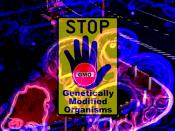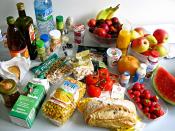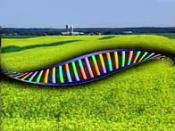The use of biotechnology in various food supplies comes with advantages and disadvantages: it is up to food companies to enhance the knowledge of their consumers about the greater number of benefits.
Food biotechnology is "a process scientists use to enhance the production, nutritional value, safety, and taste of foods (What Is Food Biotechnology?)." Even though this sort of method has been used since the beginning of agriculture itself, the recent genetic discoveries have taken agriculture to a whole new level. Genetically modified organisms (GMOs) can be used to yield a more bountiful harvest, thereby increasing the world food supply. They can be made to be more resistant to environmental injury, such as insects, hence requiring less use of pesticides. GMOs can be higher in nutritional value, as shown by the "golden rice" trend. As the National Food Processors Association put it, "The benefits are nearly limitless!"
Of course, there are potential risks related to this technology.
Since the genetic part has been a fairly recent element, there is fear of the unknown. As of yet, those that utilize biotechnology in their supply do not know of GMOs effect on human health in the long run. Most consumers are not worried, but an interesting issue I came across was how transgenic foods could contain the genes of a food the consumer is allergic to (i.e. milk proteins in carrots, nut proteins in soybeans, etc.). Perhaps labeling foods that are produced using GMOs would be beneficial to those with food allergies. Some are also worried that the seeds from GMOs could extend into nature itself, overtaking the natural organisms and replacing them with the GMO. Since most GMOS are produced within highly barricaded laboratories, I do not think this would be a problem, save for the produce that has...


